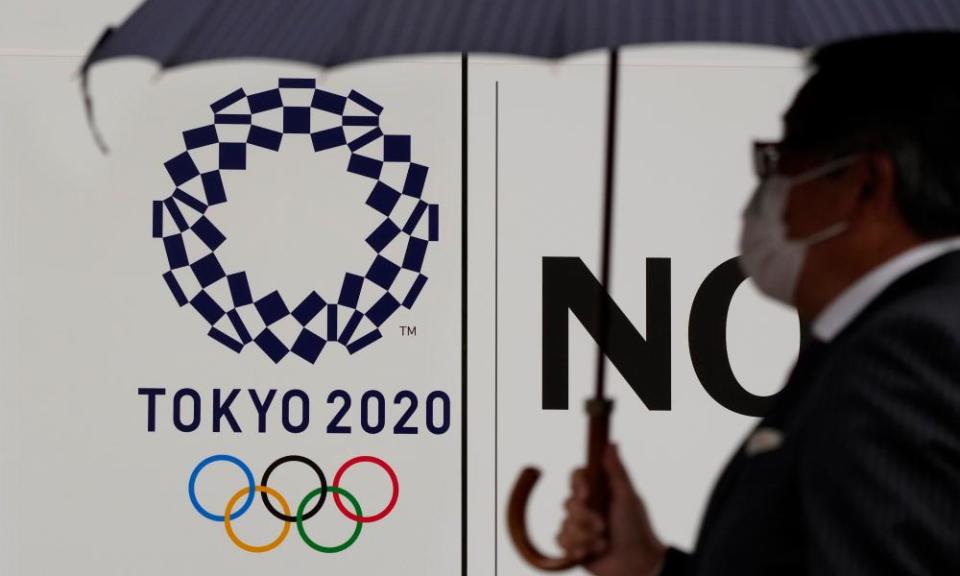100 days to Tokyo: pessimism and fear remain in Japan as Games loom

When Hideki Matsuyama sank the putt that won the Masters on Sunday, he not only made history by becoming the first Japanese man to win a major golf title – he gave the organisers of the Tokyo Olympics rare cause for celebration.
Days earlier his compatriot Rikako Ikee secured a place at the rescheduled 2020 Games in the 100m butterfly less than eight months after she had recovered from leukaemia.
Their feats were a reminder of why so many view the Olympics and Paralympics as the sum total of individual human struggles, and help explain why, in the face of a global pandemic, the Tokyo organisers and International Olympic Committee continue to insist the Games will – and should – go ahead.
Related: The Guardian view on the Tokyo Olympics: must the show go on?
But at the same time as the newly crowned Matsuyama suggested he was open to lighting the Olympic cauldron at the opening ceremony on 23 July, the scene playing out in an Osaka park was a stark reminder of the obstacles that lay in the Games’ path with just 100 days to go.
On Tuesday, when the western Japanese city reported more than 1,000 new cases of Covid-19 – its highest since the pandemic began – joggers carried the Olympic torch around the site of the 1970 world exposition, with spectators limited to just four friends or relatives of each runner.
The Osaka leg of the relay, which began in Fukushima in late March, was supposed to have passed along public roads, watched by residents who, like all other relay spectators, are under orders to socially distance, wear masks and refrain from cheering loudly. But in Osaka, as in other parts of Japan, the virus is behaving in a way that is frustrating the Tokyo 2020 countdown at every turn.
Less than a year after the then prime minister, Shinzo Abe, lauded the “Japan model” for containing Covid-19, the country has seen a steep rise in cases, the spread of new variants and renewed pressure on hospitals and health workers.
While Japan has fared better than many comparable countries in terms of caseload and deaths, its statistics are not insignificant, with half a million infections and a death toll approaching 9,500. On Tuesday, Tokyo reported 510 new infections – 111 more than a week ago – bringing its total to almost 127,000, with more than 1,800 deaths.
“The situation is very serious and we are on the brink of a level that requires another state of emergency to be declared,” Toshio Nakagawa, head of the Japan Medical Association, told the public broadcaster NHK.
Less than a month after the government fully lifted a targeted state of emergency, Tokyo, Osaka and other cities undergoing a “fourth wave” of infections are again subject to restrictions on restaurant opening hours, while local leaders plead with residents to avoid nonessential outings.
The central government has stopped short, though, of declaring a third state of emergency, apparently to avoid potential disruption to Olympic preparations. The IOC and organisers have attempted to address concerns that Tokyo 2020 could become a super-spreader event by banning overseas spectators and releasing strict codes of conduct for the 14,500 Olympic and Paralympic athletes.
According to a Covid-19 playbook released by the organisers in February, athletes will not undergo quarantine but will be tested for the virus at least every four days and told not to use public transport. An updated version of the guidelines will be released this month.
A decision on whether to open up venues to domestic sports fans is expected soon. On Tuesday, the president of the organising committee, Seiko Hashimoto, told the Nikkei business newspaper that attendances of up to 50% capacity would be a “perfect” Covid countermeasure.
Related: North Korea pulls out of Tokyo Olympics, citing coronavirus fears
Few details have been given, though, of how Tokyo will cope with an influx of media, sponsors, referees and judges, interpreters and a host of other Games-related staff that could number in the tens of thousands. While some visiting athletes are expected to have been vaccinated in their home countries by late July, vast sections of the host population will remain unprotected.
Japan has administered jabs to 1.1 million frontline health workers – less than 1% of its population – since its vaccination rollout began in mid-February. Inoculations for 36 million people aged over 64 did not begin until this week. Just 1,139 doses were administered on the first day, despite the arrival from Europe of more than 8m doses of the Pfizer vaccine, according to tracking by the Nikkei.
If Matsuyama and Ikee were reminders of the welcome diversion the Olympics could bring after more than a year of living with the virus, that prospect is not finding expression in support for even a pared-down event. According to a Kyodo news agency opinion poll released on Monday, 39.2% of respondents said the Olympics should be cancelled, while 32.8% called for a second postponement. Just 24.5% thought they should go ahead.
Organisers will mark the start of the 100-day countdown on Wednesday with an event on Mount Takao, a popular hiking spot among Tokyoites and where, every March, Buddhist monks walk barefoot across smouldering coals to pray for good health – a fitting metaphor for the troubled road to Tokyo 2020.

 Yahoo Finance
Yahoo Finance 